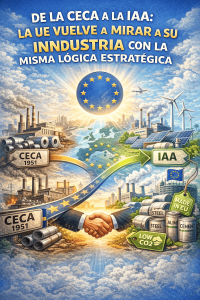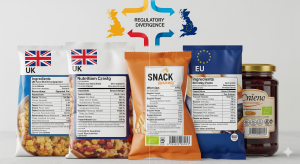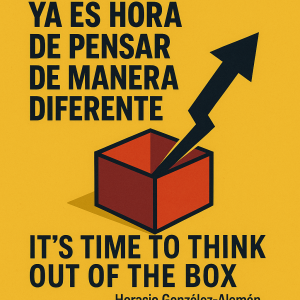YA ES HORA DE PENSAR DE MANERA DIFERENTE
IT´S TIME TO THINK OUT OF THE BOX
Horacio González-Alemán
Que la geopolítica lo está fagocitando todo es una evidencia que hace tiempo hemos asumido, y nos está dejando bien claro que el entorno del negocio no es neutro ni para la macro ni para las cuentas de resultado.
Que seamos conscientes de la realidad no me preocupa, porque lo somos, lo que sí me preocupa es que no seamos capaces de reaccionar ante la evidencia y asumamos que no hay solución. Es como si las autoridades hubieran asumido los golpes con resignación, y nada pudiera hacerse para evitarlo.
Intentaré explicarme.
That geopolitics is engulfing everything is something we have long accepted, and it is making it very clear to us that the business environment is not neutral, either for the macroeconomy or for the bottom line.
I am not concerned that we are aware of this reality, because we are, but I am concerned that we are unable to react to the evidence and assume that there is no solution. It is as if the authorities have resigned themselves to the blows and believe that nothing can be done to prevent them.
Let me try to explain.
China nos impone derechos antidumping primero al brandy y ahora al porcino, y Europa sigue el “libro de estilo” sin salirse una coma del guion. Pero todos sabemos que en ninguno de los dos casos se está vendiendo en China a un precio inferior al del mercado doméstico – es decir, no se dan las condiciones objetivas para un procedimiento antidumping-, y que todo es una sinuosa respuesta a las medidas impuestas por la UE a las importaciones de vehículos eléctricos chinos.
Por el otro lado, Estado Unidos nos impone un arancel del 15 % a la importación de productos agroalimentarios europeos y a la vez tenemos que hacer concesiones en nuestro mercado a algunas importaciones de EE. UU., todo ello para conseguir firmar la Pax Americana (aunque no sepamos por cuanto tiempo). Está claro que los “aranceles recíprocos “son un invento de Trump lejano a los principios OMC” … al igual que lo son los términos del acuerdo EE. UU.-UE, que fulmina de nuestra Politica Comercial la Cláusula de Nación más Favorecida, la piedra angular de la OMC.
A la vista de esta realidad, cabe hacerse varias preguntas:
- Las otras potencias comerciales del mundo hacen su propia interpretación de las reglas, nosotros seguimos (supuestamente) las normas de la OMC. ¿Es esa la respuesta que procede?
- ¿Por qué razón el sector agroalimentario ha de ser rehén de negociaciones en disputas de terceros ¿Está acaso en nuestra mano la solución, o somos totalmente ajenos al contencioso?
- ¿No existe acaso posible respuesta a situaciones como las descritas, que se viene repitiendo desde hace años – acero y aluminio, Boeing/ Airbus…-?
Las respuestas que me vienen a la mente tienen dos partes, una política y otra técnica, pero en los dos casos hay que pensar de forma diferente.
En el primero tenemos que recordar que somos una gran potencia comercial, y que cualquier daño infligido a Europa debe tener consecuencias para sus socios comerciales. Hay que mostrar nuestra decisión con más firmeza que la actual – hacernos valer, más confianza.
También es importante que los debates políticos no se eternicen, porque el exceso de análisis sólo nos lleva a la parálisis. Si tenemos un Chief Enforcement Officer es para algo[1].
Igualmente, importante es no seguir erosionando nuestra competitividad frente a terceros con normas de difícil cumplimiento y elevado coste que sólo obligan al productor doméstico. Si realmente la UE entra en una fase de simplificación para mejorar nuestra competitividad siguiendo la doctrina Draghi y Letta, tenemos que aligerar la carga normativa.
Graduar las ventajas arancelarias y comerciales en los acuerdos de libre comercio en función de la equivalencia de normas puede ser un primer paso.
En el segundo plano, el técnico, ya tenemos instrumentos válidos que en algún momento deberán llevarse a la acción. Estoy hablando del Reglamento 2023/2675, conocido como “instrumento contra la coerción económica”, que a mi juico es lo que estamos sufriendo ahora y que sigue guardado en el cajón.
No parece factible seguir por esta via. Hay que despertar y buscar soluciones imaginativas, salir de la parálisis hacia nuevas fórmulas para defender nuestros legítimos intereses, confiar más en nosotros.
No solo sería injusto mantener la situación actual, sino lo que es más preocupante, debilitaría seriamente la credibilidad de nuestras instituciones.
China its imposing us anti-dumping duties first on brandy and now on pork, and Europe follows the ‘style guide’ without deviating one iota from the script. But we all know that in neither case are products being sold in China at a price lower than the domestic market price – i.e. the objective conditions for an anti-dumping procedure do not exist – and that this is all a convoluted response to the measures imposed by the EU on imports of Chinese electric vehicles.
On the other hand, the United States is imposing a 15% tariff on imports of European agri-food products, while at the same time, we must make concessions in our market to some US imports, all in order to sign the Pax Americana (although we do not know for how long). It is clear that “reciprocal tariffs” are a Trump invention far removed from WTO principles… as are the terms of the US-EU agreement, which removes the Most Favoured Nation clause, the cornerstone of the WTO, from our trade policy.
In view of this reality, several questions arise:
- The other trading powers in the world make their own interpretation of the rules, while we (supposedly) follow the WTO rules. Is that the right response?
- Why should the agri-food sector be held hostage to negotiations in third-party disputes? Is the solution in our hands, or are we completely unrelated to the dispute?
- Is there no possible response to situations such as those described, which have been repeating themselves for years – steel and aluminium, Boeing/Airbus, etc.?
The answers that come to my mind are two, one political and the other technical, but in both cases we need to think differently.
Firstly, we must remember that we are a major trading power and that any damage inflicted on Europe must have consequences for its trading partners. We must show our determination more firmly than we do at present – assert ourselves, show more confidence.
It is also important that political debates do not drag on, because excessive analysis only leads to paralysis. We have a Chief Enforcement Officer for a reason [1].
It is equally important not to continue eroding our competitiveness vis-à-vis third parties with rules that are difficult to comply with and costly, and which only impose obligations on domestic producers. If the EU really does enter a phase of simplification to improve our competitiveness, following the Draghi and Letta doctrine, we need to lighten the regulatory burden.
Grading tariff and trade advantages in free trade agreements according to the equivalence of standards could be a first step.
In the background, on the technical side, we already have valid instruments that will have to be put into action at some point. I am referring to Regulation 2023/2675, known as the ‘instrument against economic coercion’, which in my opinion is what we are suffering from now and which remains tucked away in a drawer.
It does not seem feasible to continue along this path. We must wake up and seek imaginative solutions, break out of the paralysis and find new ways to defend our legitimate interests, and have more confidence in ourselves.
Not only would it be unfair to maintain the current situation, but more worryingly, it would seriously undermine the credibility of our institutions.
[1] From my own experience: eight months ago, I filed a complaint on behalf of a client with DG Trade’s Market Access Service… and I am still waiting for a reply!
[1] Por experiencia propia: hace 8 meses interpuse para un cliente una denuncia ante el servicio de Market Access de la DG Trade… ¡y todavía estoy esperando una contestación!






